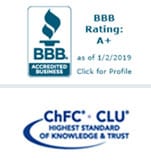

The average federal tax refund for 2019 is $2,725—enough to buy two 70-inch flat screen TVs and a steak dinner. But while it might be tempting to rush off to the nearest Best Buy and indulge in a luxury purchase, GoBankingRates reports that most Americans plan to use their refunds to pay down debt, invest, or save for retirement. Here are ten ways you can put your hard-earned tax refund back to work for you.
1. Slash credit card debt
With interest rates as high as 30%, credit card debt is some of the most toxic debt Americans carry. Not only can unpaid balances tank your credit score and keep you from buying a house, but the chronic stress of making monthly payments can lead to expensive health problems like migraines, ulcers, and even heart attacks. If you are one of the 27% of Americans who plan to use their tax refund to pay down debt, we suggest starting with the plastic in your pocket.
2. Grow your emergency fund
According to a Bankrate survey, an emergency expense of $1,000 or more would push 60% of Americans into debt. That leaves less than half the country prepared to pay for an emergency room visit or car repair. An emergency fund should be kept separate from your regular savings account. Many online banks make it easy to set up new accounts and offer interest rates that are more than double what you can expect from their brick and mortar counterparts.
3. Save for retirement
In 2019, the max contribution for retirement accounts is going up. You can now contribute up to $6,000 to Traditional and Roth IRA’s, plus $1,000 in catch-up contributions if you’re over age 50. Have a 401(k)? You can now contribute up to $19,000, plus an additional $6,000 (age 50 and up). By adding your tax refund to your retirement savings now, you give it years to grow tax-free.
4. Invest
On average, the stock market returns 7% per year, about three times more than the annual return from high-yield savings accounts, which currently top out at 2.35%. That 7% is not guaranteed, however. Sometimes you’ll make more, sometimes less. And, if you choose to invest in the market directly, there is also a certain amount of risk involved. A financial advisor can help you determine how much stock market risk is appropriate for your situation.
5. Pay off your mortgage
If you are on top of your credit cards and have enough money in your emergency fund to cover a surprise expense, you might want to consider using your refund to pay off your house. Paying down your mortgage ahead of schedule can save you thousands in interest payments later on. There are two ways to make this work; refinancing your loan or making a one-time payment. When you refinance a loan, you essentially replace your current mortgage with another loan for the amount you still owe, but often with a lower interest rate and/or smaller monthly payment. If you make a one-time payment, you will owe less overall, but your monthly payment will remain the same. Just make sure your lender is aware that the payment should go toward your principal.
6. Turn your hobby into a business
Thanks to the internet, whether your passion is quilting, woodworking, or making sculptures out of cat hair, you can probably monetize it. A small side business like an Etsy store can supplement your income and give you an opportunity to unleash your creativity. Use your tax refund to cover start-up costs, materials, and even a modest marketing campaign, and live your cat hair sculpture dreams!
7. Repair your home/car
Meaning to get your driveway repaved or have that check engine light looked at? Now is the time! Assets like your house and car are figured into your total net worth, which affects your credit and loan-worthiness. By keeping assets in good shape, you maintain their value—and your financial health.
8. Build your skills
Still working? Use your tax refund to pay for classes online or at a local community college and your new skills could get you a raise. Coding, public speaking, and Excel are all in high demand with today’s employers.
9. Expand your horizons
Your credit cards are all paid off, you’ve maxed out your retirement account contributions, and your emergency fund could handle multiple ambulance rides. Sounds like you’ve earned a splurge. Rather than spending your tax refund on material possessions, which studies show are ultimately less satisfying, we suggest putting that money toward a memorable experience. Whether that’s a vacation, a bucket list item, or tickets to see Bob Dylan, is up to you.
10. Donate to charity
While philanthropy won’t grow your money like many of the other entries in this list, that doesn’t make it any less valuable. Giving back benefits your community, your mood, and even your health. Plus, you might be able to claim it as a deduction on your next tax return.


Sara McKinney
saractag@gmail.com
As Cowen Tax Advisory Group’s Digital Content Marketing Specialist, Sara provides in-house copywriting and manages the company’s electronic records system, email marketing, and blog.




